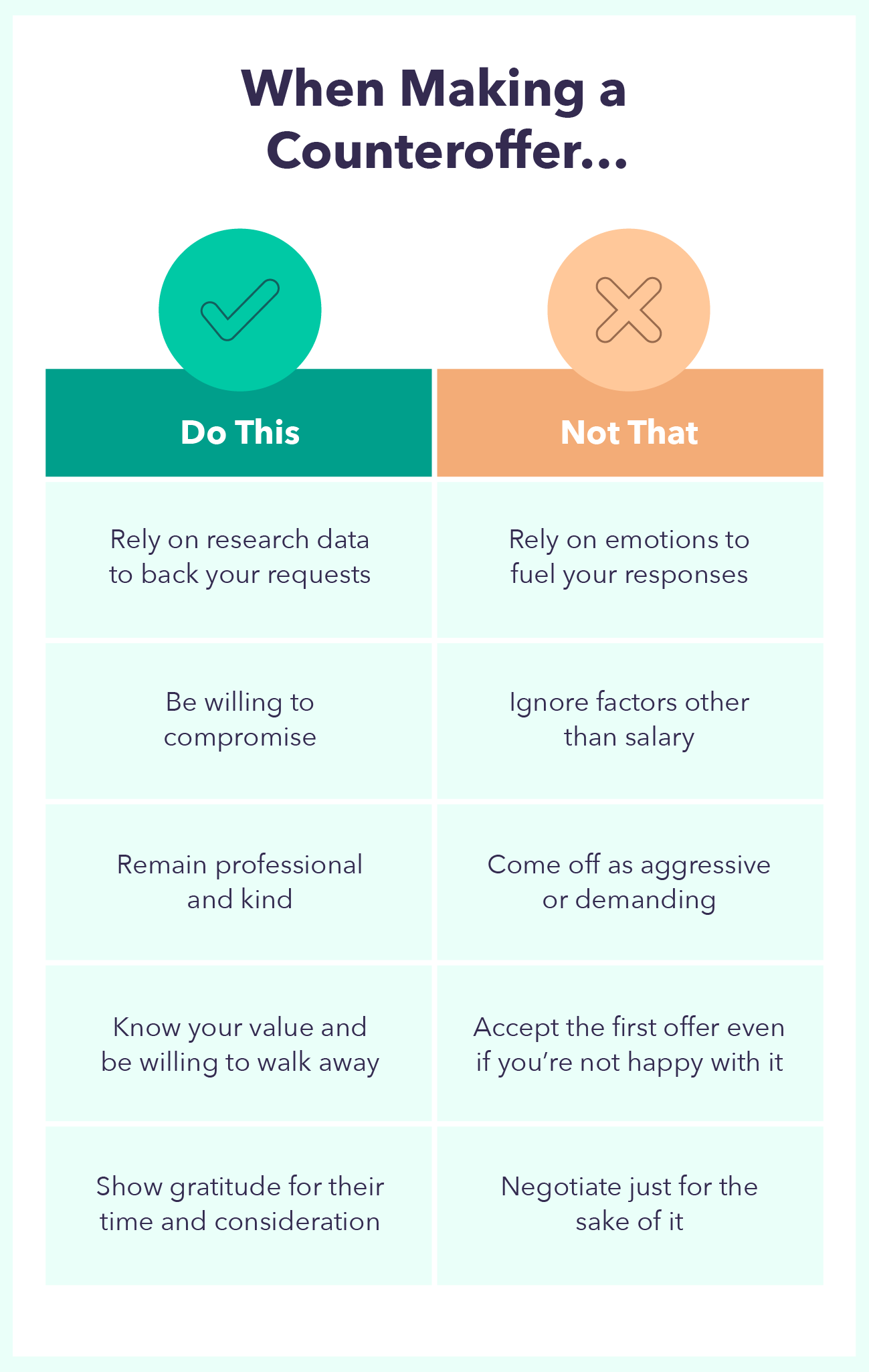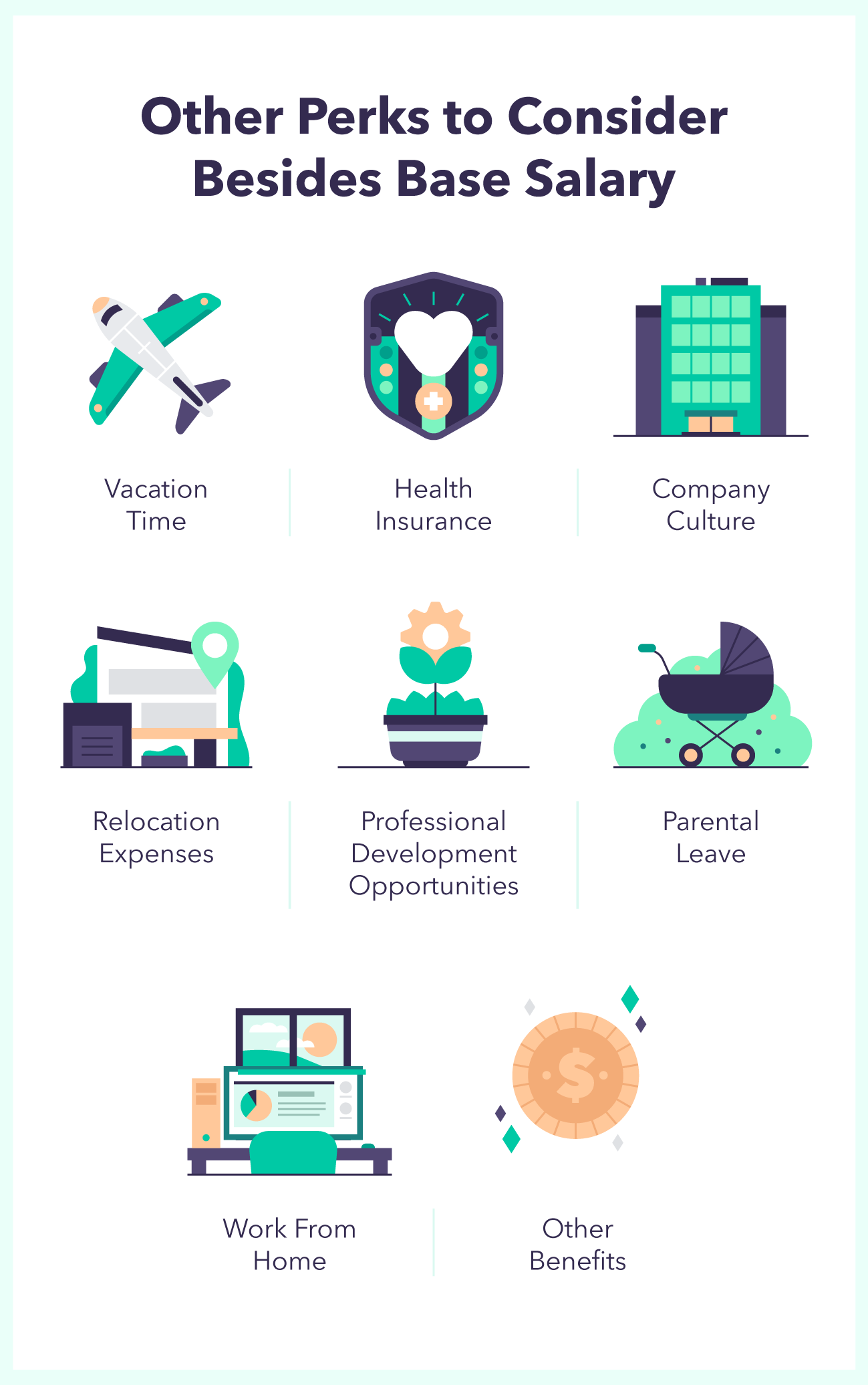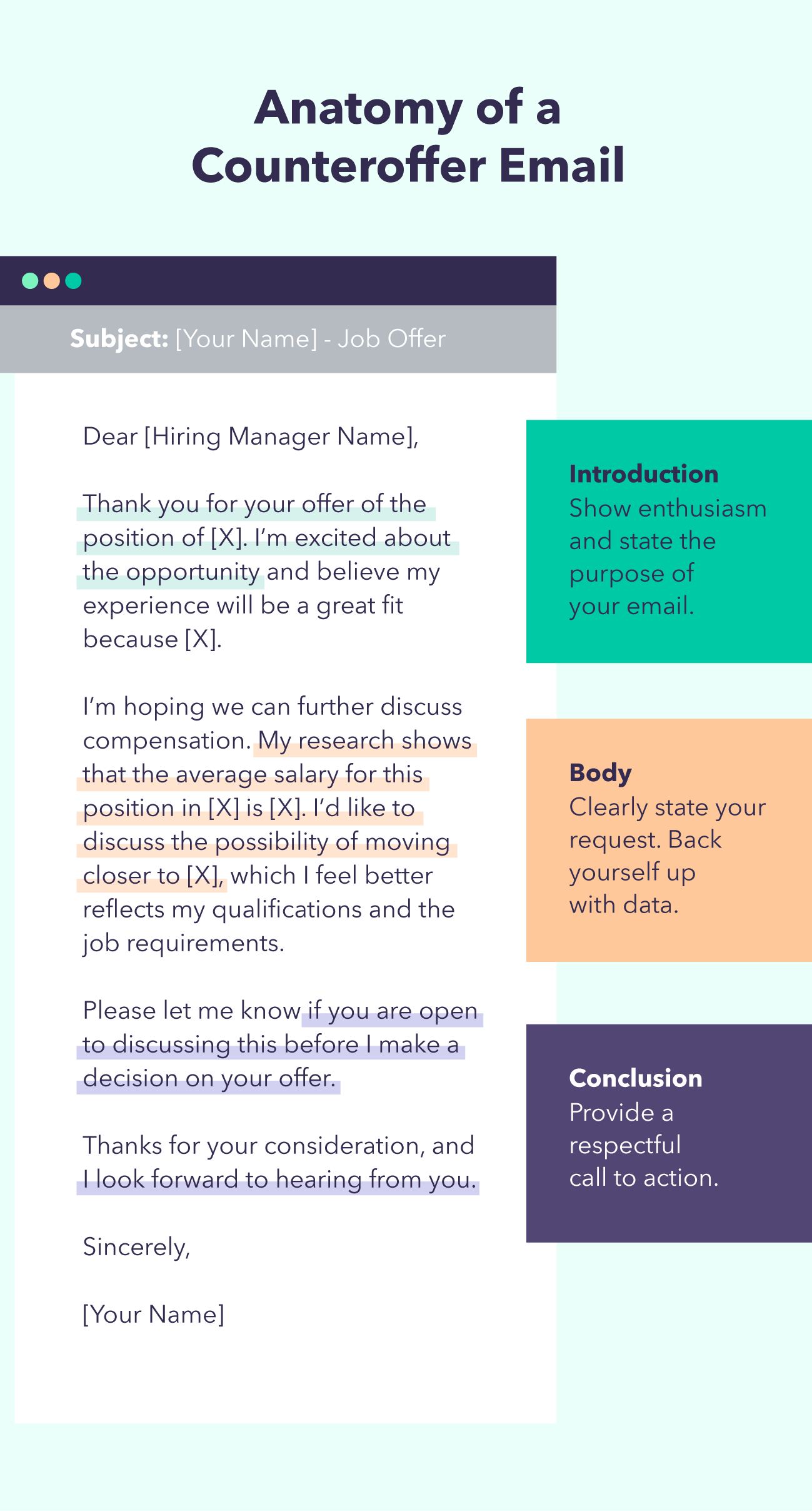You’re in the middle of your job hunt and exhausted from countless applications, fine-tuning your resume, and multiple interviews. Finally, you’ve been offered a job from a great company. All that time and preparation have paid off! However, your heart sinks as you realize that the offered salary isn’t quite what you were hoping for.
Don’t panic. If a company’s job offer falls a little short of your expectations, now is a great time to learn how to counter offer salary.
In this article, we’ll explore how to counter offer salary in a job offer. We’ll go through steps you can take to prepare for a low salary offer, how to negotiate your salary, and more. Plus, we included counteroffer letter examples for various scenarios that you can use in your correspondence with a prospective employer.
What Is a Counteroffer?
A job candidate makes a counteroffer if they feel that the offered salary for a job doesn’t meet their needs or expectations. The offer may fall short of what they feel matches their skills and experience in their industry and what they can bring to the table at their new company.
A counteroffer can be conducted over the phone or via email. Once the candidate counters the offer, the hiring manager will decline, accept, or negotiate the offer to land on a compromise.
When To Make a Counteroffer
When is it appropriate to make a counteroffer?
If you’ve done your research and set a reasonable target range based on the average salary for your position, experience, and skills, you will know if the offer falls short.
If you receive a low offer, don’t give in and just accept without advocating for yourself. You deserve to receive a reasonable salary at a fulfilling job. Many companies will offer you the lowest salary they can get away with, so if you think you deserve more but don’t negotiate, you could be leaving money on the table.
If the company’s offer falls below the low end of your target salary range, consider making a counteroffer.

How To Counter Offer Salary
Even if you know you’re going to make a counteroffer, don’t hastily rush into a reply. Take a moment to think it over and don’t rely on your emotions or rash judgment. Instead, go through these steps to effectively counter a salary offer.

1. Do Your Research
If you haven’t already researched salary ranges for your position, now is the time to do so. Doing your research on average salary ranges for your position will help you know how to counter your job offer. It will also help you back yourself up with data. You are more likely to be taken seriously if you give a clear ask and a why in your counteroffer. The research is the why—you’ll be able to pull data from average salaries for your position to explain why you believe a higher salary is appropriate.
You can use tools like the Mint Salary Tool to conduct research. It’s a good idea to set a target salary range for yourself early on, so you know exactly how to react when you receive a less than desirable offer.
If you don’t receive the compensation package you feel that you deserve, communicate this with the hiring manager. You can bring in the average salary for the position and the cost of living in your area to ensure you’re being fair and reasonable in your counteroffer.
2. Consider Non-Salary Benefits
Take time to comb through the initial offer. Consider the entire compensation package and make a list of the pros and cons. For example, the company might offer an enticing health insurance package or unlimited PTO. Would it be worth it to you to accept a lower salary while having more time off?

3. Know Your Value
Besides the average market rate for your position, you should also take your experience and qualifications into account. Do you have specific, in-demand skills that are valuable in your industry? Do you have unique work experience that makes you especially valuable to the position? Reiterate what you can bring to the table when counter-offering a salary.
Additionally, if another company has offered you a higher salary, you can use this to your advantage. You can bring up the fact that you have another competitive offer to incentivize the employer to improve your compensation package if they really want you. Just take care to still show respect and enthusiasm for the company, or you may end up turning them away.
4. Take Time to Craft Your Counteroffer
It’s a good idea to tell the recruiter that you will need to take a couple of days to consider the offer so you have time to make the best plan of action. Send the recruiter an email thanking them for the job offer and ask if they mind if you take two to three days to consider. Give them a specific day that you will get back to them. Take this time to weigh the pros and cons of the job offer and decide how you’ll phrase your counteroffer.
5. Submit All Your Requests At Once
Whether you convey your counteroffer over the phone or via email, you should submit all your requests at once. This will help make communication as clear as possible and eliminate unnecessary back-and-forth messages with the recruiter.
6. Negotiate
While prolonged back-and-forth communication can get frustrating for both you and the hiring manager, don’t shy away from negotiation. If it’s worth it to you, use negotiation tactics to professionally reach a compromise.
7. Prepare For Their Response
There are a few possible scenarios for how the employer could respond to your counteroffer. Make sure to be prepared for each one.
- They could reject your counteroffer
- They could accept your counteroffer
- They could offer a compromise that is closer to your salary expectations
- In a worst case scenario, they could rescind the job offer
8. Make Your Decision
Once you’ve negotiated and gotten the final offer from the company, you will need to make your final decision. If you can’t reach a compromise, don’t be afraid to walk away from the offer.
See the templates below to get an idea of how to accept or reject the final job offer.
Accepting the Offer
| Dear [Hiring Manager Name], I am very pleased to formally accept the job offer for the position of [Position] with [Company]. Thank you again for the opportunity, and for working with me to land on a compensation package that benefits us both. I’m excited to get started collaborating with the team and making a positive impact at [Company]. As discussed, my starting salary will be [Salary], and I will be eligible for benefits after [Number of days] of employment. I look forward to starting on [Date]. Thank you again! Sincerely, [Your Name] |
Rejecting the Offer
| Dear [Hiring Manager Name], Thank you very much for the offer of employment at [Company]. I sincerely appreciate your time and consideration, as well as your willingness to try to find a compromise for the compensation. After careful consideration, I have made the difficult decision not to accept the position. Thank you again for the opportunity to discuss the job and for the offer. I regret that it didn’t work out, but I wish you the best in finding a suitable candidate for this position. Sincerely, [Your Name] |
Tips for Negotiating a Counteroffer
Here is a list of general tips when you’re learning how to counter a salary offer. Keep these in mind all throughout the salary negotiation process.
- Be Kind, Patient, and Professional: You should be clear and firm when conveying what you want, but steer clear of coming off as aggressive.
- Be Willing to Compromise: Consider perks other than the salary and be willing to come to a compromise if the company is a great fit for you.
- Don’t Give an Ultimatum: It’s best not to give an ultimatum when negotiating salary. Allow the recruiter to respond to you in their own time.
- Get Everything in Writing: If you negotiate over the phone, make sure to also confirm and reiterate everything in writing for future reference.
- Practice: Practice your negotiation tactics out loud with a friend or family member and ask for their feedback to improve.
Counter Offer Salary Email Examples
Here is a basic template to follow when structuring your counteroffer email to your hiring manager or prospective employer:

Below are four counteroffer salary email examples that you can use for different scenarios. Make sure to personalize each to your specific situation and thoroughly proofread your email before hitting send. Have a friend read it over to make sure you’re coming across as respectful and professional.
Requesting a Meeting to Discuss Salary Further
Sometimes, email just isn’t the place to negotiate salary. If you would prefer to counter offer a salary over the phone, use this email template to request a meeting with the recipient to further discuss your salary.
| SL: [Your Name] – Job Offer Dear [Hiring Manager Name], Thank you very much for your offer of the position [Position Name]. I’m impressed by [something about the company or team], and I’m excited about the opportunity. I believe my experience will be a great fit for the position because [explain]. Before I make my final decision, I would like to see if we can meet to discuss the compensation. With my [X] skills and [X] years of experience that I can bring to the team in mind, I believe it would be appropriate to discuss my salary and benefits further. Please let me know if you’re available to further discuss my total compensation package. I’d be happy to discuss via [METHOD] at [DATE/TIME]. Thank you for your consideration, and I look forward to hearing from you. Sincerely, [Your Name] |
Asking For Additional Compensation Via Email
If you want to counter offer the salary via email, get the ball rolling with the template below. This template provides a framework for you to bring in industry research on average salary as well as your own skills and experiences to explain why a higher salary might be appropriate.
| SL: [Your Name] – Compensation Dear [Hiring Manager Name], Thank you very much for your offer of the position [Position Name]. I’m impressed by [something about the company or team], and I’m excited about the opportunity. I am confident my experience will be a great fit for the position because [explain]. I’m hoping we can further discuss the base salary. My research shows that the average salary for this position in [Location] is [Range]. I would like to discuss the possibility of moving closer to [Amount], which I feel better reflects my qualifications and the job requirements. Please let me know if you are open to discussing this before I make a decision on your offer. Thank you again, and I look forward to hearing from you soon. Sincerely, [Your Name] |
Responding to a Lowball Offer
If you are disappointed to receive a low offer from your dream employer, don’t give up on the position just yet. Use the template below to explain what you were hoping to receive and why, and see if they might be willing to compromise.
| SL: [Your Name] – Job Offer Considerations Dear [Hiring Manager Name], Thank you very much for your offer of the position [Position Name]. I’m impressed by [something about the company or team], and I’m excited about the opportunity. I am confident my experience will be a great fit for the position because [explain]. I’m hoping we can discuss the base salary further. Unfortunately, the offer seems to be lower than the average salary for this position in [Location]. Based on my qualifications, my research shows that the average salary for this position is [Range]. I was hoping for something closer to [Amount], which I feel better reflects my qualifications and the job requirements. Let me know if you are open to discussing this before I make a decision on your offer. Thank you again, and I look forward to hearing from you soon. Sincerely, [Your Name] |
Leveraging a Higher Offer From Another Company
Receiving a higher offer from another company puts you in a powerful position. While remaining respectful, you can leverage an offer from another company to see if a prospective employer is willing to match that offer. It can be better to do this via phone call rather than email, but if you choose to go the email route, here’s a template to use as a guide.
| SL: [Your Name] – Compensation Dear [Hiring Manager Name], Thank you very much for your offer of the position [Position Name]. I’m impressed by [something about the company or team], and I’m excited about the opportunity. I am confident my experience will be a great fit for the position because [explain]. I did want to let you know that I am considering a strong offer from another company right now. I have received another offer with a base salary of [$____]. I’m excited to be a part of your team and would be ready to accept your offer if you would be able to [MATCH OR EXCEED] this base salary. Let me know if you are open to discussing this further. I appreciate you working with me to work out a compensation plan that will be beneficial to both of us. Sincerely, [Your Name] |
Now that you know how to counter offer a salary, you won’t be caught unprepared by a lackluster job offer. Use Mint’s salary tool to thoroughly research salary trends in your area to know your worth and walk into your next salary negotiation with confidence.
See Average U.S. Salaries
The post How To Counter Offer Salary [With Email Templates] appeared first on MintLife Blog.
from MintLife Blog https://ift.tt/AgSy4eB
Comments
Post a Comment
We will appreciate it, if you leave a comment.